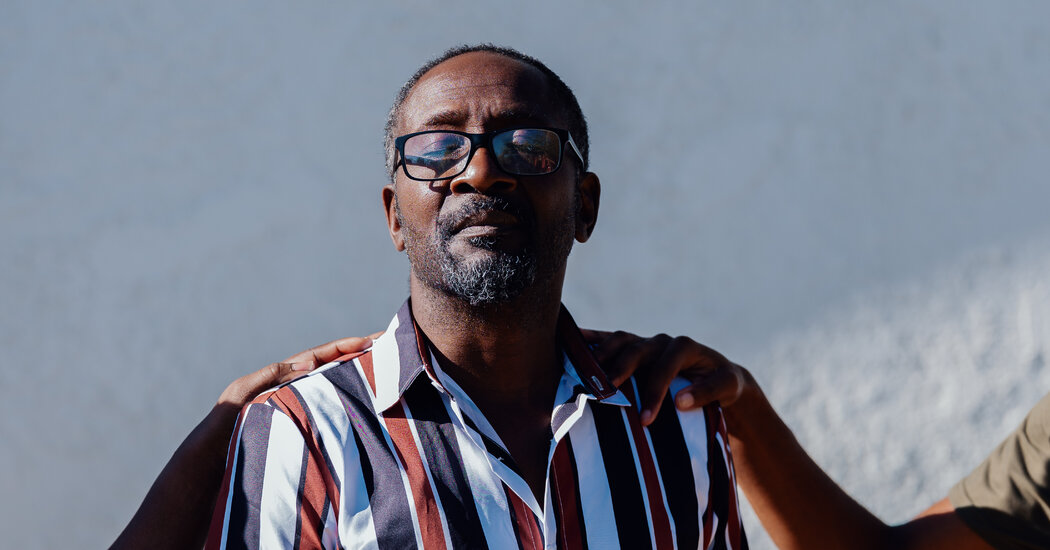Tony Shepard learned he had vocal cord cancer this spring, but he was encouraged when his doctor said he had an 88 percent chance at a cure with chemotherapy and radiation.
That outlook began to dim in recent weeks, though, after the oncology practice he goes to in Central California began to sporadically run out of the critical medication he needs.
Since Mr. Shepard’s doctor informed him of the shortage, each treatment session has felt like a game of “Russian roulette,” he said, knowing that failure would mean the removal of his vocal cords and the disappearing of his voice.
“I try not to even think about it,” said Mr. Shepard, 62, a manager of a gas station in Madera, a town in California’s Central Valley. “It’s something scary that you don’t really want to think about — but you know it’s a reality.”
The nation’s monthslong shortage of highly potent cancer drugs is grinding on, forcing patients and their doctors to face even grimmer realities than those cancer typically presents. Thousands of patients like Mr. Shepard have been confronting gut-wrenching options, delays in treatment and potentially bleaker futures.
Oncologists are concerned that the alternatives to two crucial chemotherapy drugs are far less effective in treating certain cancers, and are sometimes more toxic. The backup therapies or lack thereof, they say, pose particularly troubling prospects for patients with ovarian, testicular, breast, lung and head and neck cancers.
There are few, if any, signs that the shortage will ease anytime soon. A plant that was a main producer of the more popular drugs shut down late last year and has not reopened, depleting its stock. The easing of restrictions on imported drugs from China this month has provided some relief, but doctors said the influx has yet to make much of a dent. Some companies that sell the medications are projecting that the shortage will last through the fall or later.
So far, neither a group of experts organized by the Biden administration nor prominent medical organizations have found a way to avoid rationing the crucial chemo drugs.
To bridge the gaps, some doctors are extending care intervals and skimming precious milliliters to stretch doses. Others are turning to a strategy of surgery first and chemo later, banking on a resumption of supplies.
One of the nation’s top cancer care groups, the American Society of Clinical Oncology, is now advising doctors with low quantities of the medications to administer them to patients with a shot at a cure — and to deny them to patients with recurrent or widely spread disease.
?? “We’re in a situation where patients are being left behind, and we’re really worried survival could be affected by the chemotherapy shortage,” said Dr. Angeles Alvarez Secord, president of the Society of Gynecologic Oncology and a professor at Duke University School of Medicine.
Two main chemotherapy drugs, cisplatin and carboplatin, are deployed as frontline medicines in cocktails used to shrink or eliminate tumors. More than a dozen cancer drugs are also officially in short supply, as well as hundreds of other medications, including antibiotics and sterile injectable fluids. Still, doctors predict that the absence of the powerful chemotherapies may hurt patients most.
Cisplatin and carboplatin are inexpensive: They cost $15 and $23 per vial, according to the U.S. Pharmacopeia, a nonprofit aimed at medication safety and supply. But manufacturing the drugs requires a reliable supply of platinum, a metal used, as well as a sterile plant and special controls to protect workers from the drugs’ toxic effects. As a result, few companies make them.
The most recent shortages of these widely used drugs occurred when a leading manufacturer, Intas Pharmaceuticals, shut down production in December after the Food and Drug Administration had performed a surprise inspection at its plant in Ahmedabad, India. The U.S. agency issued a report that said employees were shredding, tearing and pouring acid on quality control records and noted a “cascade of failure” at the site.
The company’s subsidiary, Accord Healthcare, in Durham, North Carolina, said recently that it was still making improvements at the plant that were needed to restart production.
By this spring, the effects of the Intas shutdown were deeply felt. A survey by the National Comprehensive Cancer Network of academic treatment centers released earlier this month found that 93 percent of the 27 centers that responded were experiencing a carboplatin shortage. As a result, 36 percent of them reported altering treatments for their patients, resorting to lower doses and longer intervals between therapies.
At cCare Cancer Center in Fresno, Calif., where Mr. Shepard receives care for his vocal cord cancer, efforts to stretch supply have given way to sporadic availability. For the last six weeks, vials of the platinum drugs have been unavailable roughly half of the time, an oncologist, Dr. Ravi Rao, said.
He said Mr. Shepard’s odds of a cure without the drugs would fall from roughly 90 percent to about 45 percent. Fortunately, Mr. Shepard said, the drugs have been available for the first two of seven treatments.
Patients with ovarian cancer are facing the worst outlook, Dr. Rao said, because of how common the disease is and how central the platinum drugs have been in tackling it for decades. Without those drugs, one patient with extensive ovarian cancer has odds of survival that fall to the single digits from about 30 percent, he said.
“This shortage will lead to people dying,” said Dr. Rao, who is also a board member of the Community Oncology Alliance. “There’s just no way around it. You cannot remove these lifesaving drugs and not have bad outcomes.”
Others who face heightened threats are patients with testicular cancer, because cisplatin has a known record of curing even advanced cases, said Dr. Julie Gralow, the ASCO chief medical officer, in her testimony to a House subcommittee earlier this month.
“This is critical, impacting maybe as many as half a million Americans with just these two drugs,” Dr. Gralow said.
For Florida Cancer Specialists, with more than 90 sites, the shortage initially meant conserving 10 to 15 percent of a patient’s dose to stretch stock, said Dr. Lucio Gordan, president of the practice.
That was not enough, so doctors began to only give the drugs to patients with a chance at a cure or those enrolled in clinical trials. The practice found some products at vastly inflated prices — apparent price gouging — but bought them anyway.
Still, by May, the practice was without carboplatin for 12 days and cisplatin for eight days, Dr. Gordan said.
Arias Pitts, 33, who was diagnosed with an aggressive breast cancer in April, encountered the shortage when she arrived to begin treatment on May 16. The carboplatin her doctor had ordered for the first of six rounds of chemotherapy was not available.
“Of course I had questions and concerns,” said Ms. Pitts, an academic adviser at the University of South Florida and a single mother of a 4-year-old. She added: “It’s stressful.”
The F.D.A. has taken steps to ease the shortage. It oversaw the testing and release of batches of the platinum drugs manufactured by Intas in India that were made before the shutdown, but that stock has now been exhausted.
It is also temporarily allowing Qilu Pharmaceuticals, based in China, to ship its cisplatin to the United States.
Jordan Berman, a vice president of Apotex Pharmaceuticals, a Toronto company importing the Qilu drugs, said it received shipments of cisplatin on June 6 and began routing them through major U.S. distributors.
Oncologists and supply chain experts said there was little data so far to gauge the effect the imports would have. About 600 vials of cisplatin from China arrived at Florida Cancer Specialists earlier this month, Dr. Gordan said. But that was not enough for the practice to resume offering the drugs to patients with advanced or recurrent cancers.
“It’s about six days of treatment for us,” Dr. Gordan said. “We’re scrambling.”
Studies in the 1980s and 90s showed that the platinum drugs were a vast improvement over existing treatments, performing best in combination with other drugs and doubling the response rates for ovarian and head and neck cancer. The platinum drugs pushed the five-year survival rate for testicular cancer to 95 percent from roughly 10 percent.
While newer immunotherapy treatments have improved the outcome for patients with certain types of cancer, like melanoma, oncologists also include them in cocktails with the platinum drugs to extend their lives and enhance the potential for survival.
“In general, we haven’t seen these home runs in cancer” in recent years, said Dr. Mikkael Sekeres, a University of Miami oncologist and former F.D.A. oncology adviser.
Oncologists advising the field amid the current shortages have urged those treating early-stage lung cancer patients to send them to a center that has the drugs, noting, “there are no equally effective alternatives.”
Dr. Evan Myers, a Duke University researcher in the obstetrics and gynecology department, said he was planning to measure the effects of the shortages. One study of a different medication shortage affecting children and adolescents with Hodgkin’s lymphoma found that the substitute drug was “significantly less effective,” and reduced the survival rate for the young people who received the backup treatment.
Dr. Myers said this year’s shortages would, at a minimum, likely have an effect on the quality of life for people undergoing treatment. “They’re going to be waiting for the other shoe to drop,” he said.
Doctors are also struggling with how to convey such devastating news, said Dr. Prasanthi Ganesa, medical director of The Center for Cancer and Blood Disorders in Fort Worth. Her practice is looking at each case individually, but is also prioritizing crucial doses for patients who could potentially be cured.
“I can imagine a patient listening to this and saying, ‘You know, I am trying to live longer, that is my priority. So I need that drug, doc,’” she said. “We feel really helpless.”
The situation demands action, said Dr. Karen Knudsen, chief executive of the American Cancer Society. The White House and Congress, which have discussed the problem, have advanced few concrete solutions.
“The necessity for a durable solution is growing greater by the day,” Dr. Knudsen said, adding, “Patients are left hanging.”




